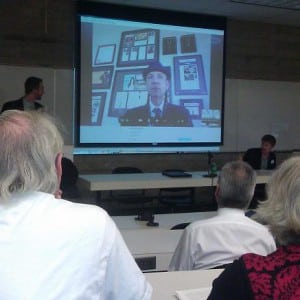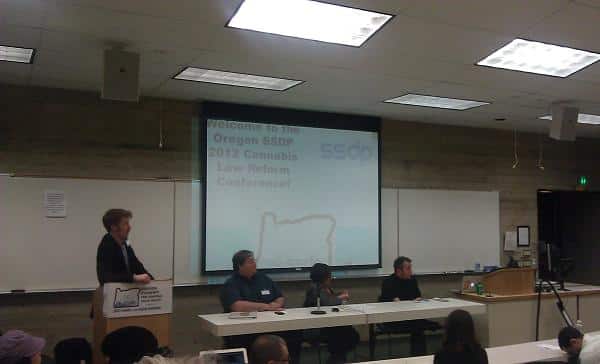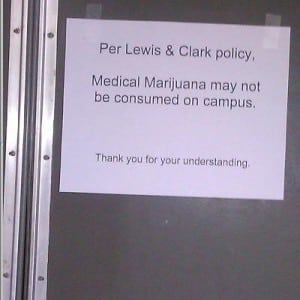 Oregon Students For Sensible Drug Policy Vote To Endorse the I-24 Campaign To End Marijuana Prohibition In Oregon
Oregon Students For Sensible Drug Policy Vote To Endorse the I-24 Campaign To End Marijuana Prohibition In Oregon
Today I attended the first ever Cannabis Law Reform Conference at Lewis and Clark Law School in Portland, Oregon. The pro-marijuana conference was hosted by the six Oregon chapters of Students for Sensible Drug Policy (SSDP). According to to the conference Facebook page, “Oregon SSDP is a network of hundreds of students from Reed College, Lewis & Clark College, Western Oregon University, Portland State University, University of Oregon, and Lewis & Clark Law School, with more chapters in the works.”
SSDP State Coordinator Sam Chapman, who I can say first hand is a very hardworking marijuana activist, stated the inspiration behind the conference on the SSDP blog, “Through the 2012 Cannabis Law Reform Conference, we hope to inspire unity of purpose and coordination among the various competing marijuana legalization initiatives in Oregon.”
“Today’s youth are tired of being prosecuted by draconian drug laws that are blatantly discriminating based on age, class, and race.” says Chapman. “We are tired of getting arrested, losing scholarships, and losing our futures over a relatively harmless substance, one that contributes far less mental, physical and social harm than alcohol.”

The conference started with a very special guest, none other than Harborside owner and Weed Wars TV star Steve DeAngelo via Skype. Steve gave a very inspirational speech about how important the youth vote will be in this election, about how important college students are to the marijuana movement, and even invited the SSDP students to apply at Harborside when they are done with college. I was very impressed with how Steve DeAngelo emphasized unity, and that it’s not about each person, or each initiative, it’s about the plant and pursuing the end of prohibition above all else.
The conference then moved into a panel discussion involving a representative from each of the three Oregon marijuana initiatives present, moderated by SSDP State Coordinator Sam Chapman. Sam gave each person ten minutes to explain the initiative they were representing, where they were with their efforts, and why people should support their particular initiative. It wasn’t a debate; the panel was more of a discussion about the merits of each initiative. I like how each representative stuck to that format.
Representing the Oregon Cannabis Tax Act 2012 was Paul Stanford. Representing Sensible Oregon was Madeline Martinez. Rounding out the trio was TWB author Adam Smith, representing Citizens for Sensible Law Enforcement. All three people did a great job of describing why their initiatives deserved votes, and above all, that they would support any of the efforts that made it onto the ballot. There are so many times that I have seen a lot of fractures in the Oregon marijuana activism network and I was very proud how everyone encouraged the crowd to sign all three efforts.

According to the panel discussion, as of right now the Oregon Cannabis Tax Act has roughly 50,000 signatures. Citizens for Sensible Law Enforcement has over 35,000 signatures, and Sensible Oregon, the admitted underdog, has a little less than 800 signatures. Paul Stanford said about 98% of the campaign money for the Oregon Cannabis Tax Act 2012 has so far come from patrons of his medical marijuana clinics, but didn’t specify an amount.
Madeline Martinez admitted that Sensible Oregon is not as well funded as the other two campaigns and only has thousands of dollars on hand, but pointed out that Sensible Oregon would poll very well if given a chance. Adam Smith stated that Citizens for Sensible Law Enforcement has about $250,000 committed*. Adam Smith elaborated a little bit about a strategy to get more funding for Citizens for Sensible Law Enforcement, but was limited due to lack of time. I was going to ask the other two campaigns about their strategies, but the time constraints didn’t allow it. I will post their information as soon as I get the e-mails, which I will hopefully get from Paul and Madeline soon.
 After each campaign had a chance to speak, the panel took questions from the audience. Questions ranged from how each campaign would affect medical marijuana, to a question from a student from Reed College asking how each initiative would affect marijuana laws for out of state students. One question that came up quite a bit was whether or not each campaign would support the other ones if they didn’t make the ballot themselves. Overwhelmingly, the answer was yes. To quote Madeline Martinez, “I don’t care who’s driving the bus, I just want to be on the fuckin bus!” Her comment received an instant cheer from the crowd.
After each campaign had a chance to speak, the panel took questions from the audience. Questions ranged from how each campaign would affect medical marijuana, to a question from a student from Reed College asking how each initiative would affect marijuana laws for out of state students. One question that came up quite a bit was whether or not each campaign would support the other ones if they didn’t make the ballot themselves. Overwhelmingly, the answer was yes. To quote Madeline Martinez, “I don’t care who’s driving the bus, I just want to be on the fuckin bus!” Her comment received an instant cheer from the crowd.
After the question segment, the members of Oregon SSDP adjourned to a different room to vote on which initiative would receive the official endorsement of Oregon SSDP. Meanwhile, the conference goers and initiative representatives enjoy some delicious snacks provided by Fred Meyers. I’m not sure how SSDP lined that up, but shout out to Fred Meyers for having an open mind! During the snack portion of the conference, I had the chance to chat with some legendary Oregon marijuana activists, such as Radical Russ Belville, the masterminds behind Stoney Girl Gardens, and Leland Berger who is the man behind the legal argument that made it possible for out of state residents to get medical marijuana cards in Oregon.
The conference had a couple of panel discussions about medical marijuana after the snacks, and ended with Oregon SSDP officially announcing a full endorsement of the Citizens for Sensible Law Enforcement campaign. I tip my hat to Oregon SSDP for putting on such a great event, and I really hope to see something like this in the future. From what I understand, this Oregon conference has inspired a similar conference at USC…If you are out there USC, send me an e-mail, I’d love to attend!
SSDP mobilizes and empowers young people to participate in the political process by pushing for sensible policies to achieve a safer and more just future, while fighting back against counterproductive Drug War policies, particularly those that directly harm students and youth
*correction – originally said “on hand”. Big difference:)
Go to NotDwightHolton.Com to find out why you should not vote for Dwight Holton for Oregon Attorney General, and ‘like’ the Not Dwight Holton Facebook Page!








